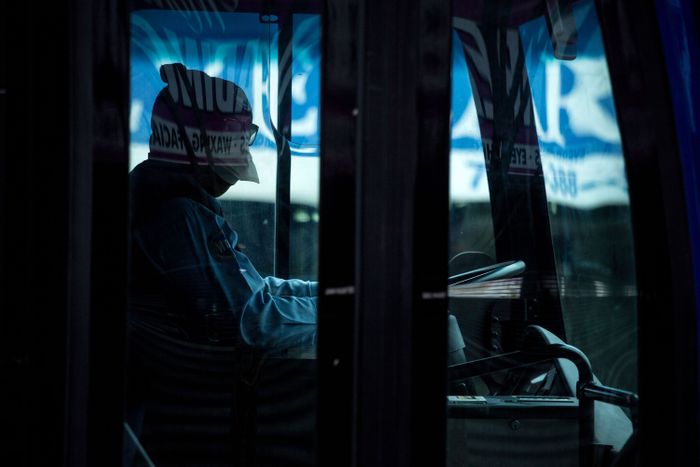
City officials have a lot of ideas about fare evasion, both why it happens (entitled latte drinkers, open doors) and how to fix it (blue-ribbon panels producing questionable wordplay, closing those doors). A recurring thread in all of it is the idea that MTA workers should be actively getting people to pay up. According to a memorandum sent by the MTA’s chief transportation officer in May, if a passenger doesn’t pay, a bus driver — the official title is bus operator — must “politely state the fare.” If the person still refuses, the operator is supposed to log the skipped fare and go on boarding the bus.
Things aren’t always that simple in practice, says Damien Lois, a ten-year veteran of the MTA. He and many other bus operators see this back-and-forth as an escalation: “They want us to state the fare, but that leads to potential situations where a person may feel threatened.” So he says he stays quiet rather than potentially endanger other passengers — and himself.
This interview has been edited and condensed.
You can make any kind of policy you want, but people are going to pay what they want to pay. As someone who’s been doing this work for close to ten years, I’m not saying a thing.
The transit authority, they try to present this notion that we’re the reason why, or part of the reason why, there’s such low fare collection. This memo went out asking us to politely state the fare. Why would they put us in a situation where we could get literally assaulted? We don’t know who’s coming on, who has weapons. I’m not enforcing a fare that can lead to me being hurt. People evade fares; it’s a daily occurrence. There’s always something. I don’t say a word. We’re drivers. If anyone is getting on my bus — straight up, honestly — my job is to get you where you need to go as safe as possible. That’s my No. 1 priority.
To do that, I have to think for not only myself but everyone that comes across my path — anyone who walks on the sidewalk, anyone who decides to ride a bike next to my bus, or anyone who tries to run alongside who wants to board the bus. I have to preplan for everything every day.
I had a situation a few weeks ago where someone wanted to board the bus in between stops, and the policy is that we just point to the next stop. She didn’t like that. This person stood in front of the bus. I call for radio assistance. They say, “Maybe they’ll walk away eventually.” So I wait. God forbid if this person was armed. Thankfully, my patience worked. She eventually walked off to the side. I’m not the first person to experience something like that.
We had an assault just the other week. Mind you, that operator was driving a shuttle — the bus that takes over when a train line is down. We follow the train stops, so we don’t pick up at certain points. Some people wanted to get on the bus. The operator indicated where the bus stop was, a few feet away. But they made their way on the bus. Mind you, it’s nothing even about the fare. They could have walked no more than a few feet, where the bus was supposed to stop, end of story. Unfortunately, that wasn’t the case. He was assaulted. They cut up his eye.
It always seems our safety is something they say is a priority, but their actions show otherwise. We’ve been lobbying for a full driver partition — an enclosed area that can physically separate operators from passengers — for a long, long time. There have been other times they said, “Oh, we’ll increase the police presence.” Police presence would be welcome if they enforced certain things. There’s designated bus lanes — you’ll see FedEx trucks, UPS trucks, even police deciding to park there. It just defeats the purpose and slows everything down.
My main goal every day is just to get home in one piece. I honestly have gotten to a point where I don’t say anything. I control what I can control.




